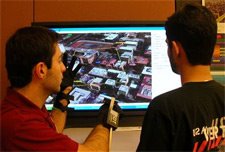Among the more interesting studies released Sunday in the second installment of the Pew Internet & American Life Project’s Future of the Internet (PDF) survey, are respondents reactions to the following hypothetical:
Prediction: As sensing, storage and communication technologies get cheaper and better, individuals’ public and private lives will become increasingly ‘transparent’ globally. Everything will be more visible to everyone, with good and bad results. Looking at the big picture – at all of the lives affected on the planet in every way possible – this will make the world a better place by the year 2020. The benefits will outweigh the costs.
The mean response of 742 individuals is of uncertainty (46% agreed vs. 49% disagree). But it’s the substance of the varied & impassioned responses that set the course for what many believe is one of the most important issues of modern time and the near future.
Here is a link to credited answers. And here’s a collection of anonymous one-liners.
The answers range from amusing to asinine, but overall the essence is that transparency — while essential to and inevitable in an open society — is a double-edged sword.
In a rather oddly phrased question, a majority of respondents agree (to my dismay) with Thomas Friedman’s mostly-BS “The World is Flat” argument, aggreeing with utopian naivete, that, by 2020, “the free flow of information will completely blur current national boundaries as they are replaced by city-states, corporation-based cultural groupings, and/or other organizations tied together by global networks.”
Perhaps it’s only appropriate — in a very Sci-Fi-esque study, that there would be no more New York and China and Japan.
Other notable conclusions from the abstract:
* A low-cost global network will be thriving and creating new opportunities in a “flattening” world.
* Humans will remain in charge of technology, even as more activity is automated and “smart agents” proliferate. However, a significant 42% of survey respondents were pessimistic about humans’ ability to control the technology in the future. This significant majority agreed that dangers and dependencies will grow beyond our ability to stay in charge of technology. This was one of the major surprises in the survey.
* Virtual reality will be compelling enough to enhance worker productivity and also spawn new addiction problems.
* Tech “refuseniks” will emerge as a cultural group characterized by their choice to live off the network. Some will do this as a benign way to limit information overload, while others will commit acts of violence and terror against technology-inspired change.
* People will wittingly and unwittingly disclose more about themselves, gaining some benefits in the process even as they lose some privacy.
As Bruce Schneier said at the USC Center on Public Diplomacy tonight, “freedom equals liberty plus privacy.” Digest that…
The IEEE prefers their recently released “Bursting Tech Bubbles Before They Balloon” survey, authored by Marina Gorbis and the Institute for the Future’s David Pescovitz.
For historical reference, see PBS’ 1998 survey: Nerds 2.0.1 — a who’s-who of nerdtrepreneurs and their late 20th century musings on the future of the Internet.



 Colbert, who recently authored a guide to
Colbert, who recently authored a guide to